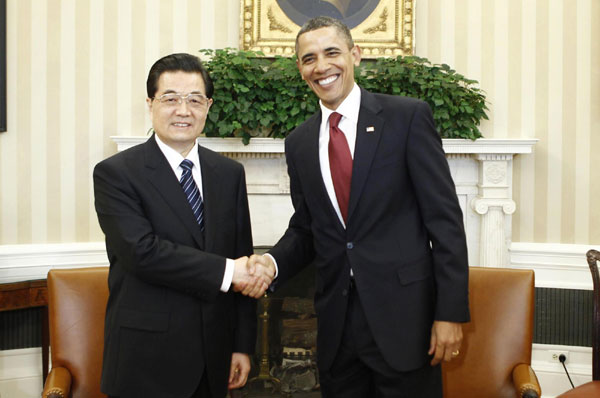Photo
Chinese, US presidents start talks at White House
(Xinhua)
Updated: 2011-01-19 23:29
 |
Large Medium Small |
WASHINGTON - Visiting Chinese President Hu Jintao and his US counterpart Barack Obama began talks early Wednesday at the White House, and are expected to "have extensive and in-depth discussions on major topics of mutual interest."
The talks, which started soon after Hu attended a formal welcome ceremony held by the US side, featured two parts -- a small bilateral meeting in the Oval Office, and then an expanded one in the Cabinet Room.
The talks are expected to focus on bilateral ties and major international and regional challenges, Chinese officials said.
Speaking at the welcoming ceremony, President Hu said he had come to the United States to increase mutual trust, enhance friendship, deepen cooperation and promote a positive, cooperative and comprehensive China-US relationship for the 21st century.
"President Hu and President Obama will map out a blueprint together for China-US cooperation for the new era. They will also have extensive and in-depth discussions on major topics of mutual interest," Chinese Foreign Minister Yang Jiechi said at a luncheon hosted by the Council on Foreign Relations in New York two weeks ago.
In a written interview with The Washington Post and The Wall Street Journal Monday, President Hu said, "China and the United States have major influence in international affairs and shoulder important responsibilities in upholding world peace and promoting common development."
"Under the new circumstances, the common interests of our two countries have been growing and areas of cooperation expanding," he said.
When meeting the Chinese foreign minister on January 4, Obama said he "looked forward to the visit of President Hu and to the US and China working together effectively to address global challenges."
After the talks, President Hu and President Obama will meet for about 45 minutes with business leaders of the two countries at the White House to discuss ways to expand trade and investment opportunities between China and the United States.
Following the meeting with business leaders, the two presidents will meet the press in the East Room of the White House.
Later, President Hu will attend the luncheon to be hosted by US Vice President Joe Biden and Secretary of State Hillary Clinton at the State Department.
According to the schedule, Obama will host Hu for an official state dinner Wednesday night.
Since President Obama took office two years ago, the overall development of China-US relations has been stable despite disputes over issues related to Taiwan, Tibet, the RMB exchange rate and trade between the two countries.
Hu and Obama agreed to build "a positive, cooperative and comprehensive China-US relationship for the 21st century" when they met for the first time in London in April 2009.
In November 2009, Obama paid a state visit to China, during which the two sides reiterated in a joint statement that "they are committed to building a positive, cooperative and comprehensive China-US relationship for the 21st century, and will take concrete actions to steadily build a partnership to address common challenges."
In the past two years, Hu and Obama have met several times to discuss how to boost bilateral ties and address major world and regional challenges.
The two sides have established the China-US Strategic and Economic Dialogue and the high-level consultation on people-to-people exchange, setting up unique and effective platforms to enhance mutual trust and cooperation between China and the United States.
Also in the past two years, the two countries have expanded mutually beneficial cooperation in the areas of economy, trade, energy, environment, culture, counter-terrorism and law enforcement, while maintaining communication and coordination in dealing with major regional and international issues.
The development of China-US relations, however, has not always been smooth. Issues related to Taiwan, Tibet, the RMB exchange rate and trade have become obstacles to the stable and healthy development of bilateral ties over recent years.
Addressing the Second Lanting Forum in Beijing last Friday, Chinese Vice Foreign Minister Cui Tiankai said, "Some of the issues between China and the United States have been there for a long time and are of great importance. The most important and sensitive of these is the Taiwan issue, an issue that concerns China's core interests of sovereignty and territorial integrity as well as the political foundation of China-US relations."
Cui said there are also structural issues between China and the United States which are the result of their different social systems, historical and cultural backgrounds and development levels.
"We also have disagreements over specific issues due to diverging interests in certain areas or lack of effective communication and coordination," he said.
All these issues and disagreements need to be "appropriately managed so as to maintain the sustained, sound and steady development of China-US relations," Cui said.
In Washington, President Hu will also meet some members of the US Congress. Later, the Chinese leader will leave for Chicago to continue his four-day state visit.
| 分享按钮 |
